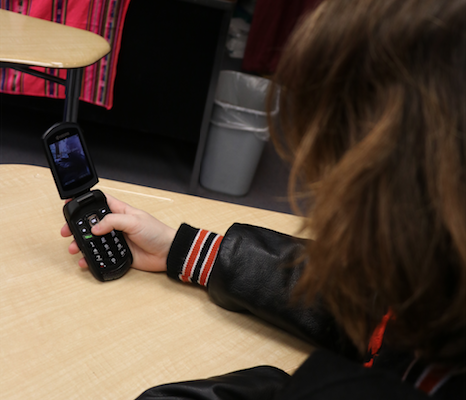As studies show cell phone anxiety rising for teens, sophomore chooses to hang up on smart phone use

Sophomore Julia Grey flips open her phone before class to send a brief text message and puts it back in her backpack. She has better things to focus on than Snapchat, Instagram and Twitter. Her classmates around her still remain immersed in their screens before the bell rings.
According to a 2016 Pew Research Center study, Americans ages 18-29 have the highest use of mobile phones, at 100 percent; 92 percent of them have smartphones, while 8 percent have other kinds of mobile phones. At Cedar Falls High School, in a survey of 201 students, 97 percent reported having a smartphone.
Almost everyone in the world carries a device in their pocket. As consumers, humans change to accommodate and shape their lives around new devices. In just one decade since the release of the first iPhone, smartphones have become part of daily life.
Except for Julia Grey, who is in the slim 3 percent of the Cedar Falls students who do not have a smartphone. Grey has been without a smartphone for the past year. After previously having an iPhone, she now has a flip phone to limit her time on social media and to not let it consume her life and social skills.
“I think that social media is such a huge part of our lives, and we don’t need it that much. I think that we really need to focus on talking to each other. I have become more social and even more than before because I am not on my phone all the time,” Grey said.
Despite the bad side effects of too much screen time and overuse, smartphones can also cause anxiety, especially in teenagers, research has found. According to Kent State University professor Andrew Lepp and his colleagues, cell phone use is “positively related to anxiety.”
“It caused a lot more issues that were never needed in my life. I was afraid of everything I said and was always extremely careful about what I put online. Now I don’t need to be scared,” Grey said.
Grey missed the real interpersonal interactions she had when she was younger.
“I recognized that almost all of my friends would be on their phones rather than talk to me or talk to anyone else, and it caused a lot of drama. Everywhere I went, no one talks to each other or is social like when we were kids because everyone is on their phones no matter what,” Grey said.
The only obstacle Grey experiences is not being in the loop of an online community through social media.
“I think the only drawback is that I don’t get invited to as many things or know the inside jokes that were in the group chats,” Grey said.
Without the constant dinging of her phone, she said she has a more peaceful life.
“I can concentrate better on things. I sleep better. There is less drama, and my life is less noisy without my smartphone,” she said.
According to a study by University of Michigan, “phantom ringing,” is a human signal detection issue derived from phones if a false sound of a phone is heard.
Many studies have been done on college students for social media anxiety including those by Alejandro Lleras, a professor of psychology from University of Illinois.
“There is no reason to believe {high school students] would have a healthier relationship with mobile phones than college age students. If anything, there are reasons to believe it might be worse because of the developmental stage of the children. 1) They are building an identity, 2) They have fewer cognitive control resources to disengage from problematic behaviors, 3) they are less mature emotionally, 4) puberty is a very emotionally powerful developmental stage where they might be at higher risk because emotions and social interactions are felt in a stronger way,” Lleras said.
Grey can see her friends and classmates anxious behavior increasing the more they are on their phones.
“I think that the progression of technology has really decreased our social skills. People are more and more anxious, and people are not as sociable or developing relationships and communicating anymore because we are always on our phones, and we are always sucked into what is on our screens. I think it’s really scary to see actually,” Grey said.
Anxiety from smartphones is starting younger. “Sometimes I wish I had a flip phone or a worse phone because then I couldn’t have Snapchat or any of the social media,” Lincoln Elementary fifth grader Ruby Schillinger said. “It is easier for me to get in fights with my friends on social media and can ruin friendships,” she said.
With smartphones becoming a norm for elementary children to have, they too may experience anxiety, like the almost 72 percent of CFHS students who reported in the survey that they have experienced some kind of anxiety from smartphone use.
Although Grey is an advocate of old-school flip phones for now, she does envision herself getting a smartphone in the future, after adolescence.
“Now that is the big question. I think I have considered that after high school I will get a smartphone because I won’t be able to rely on my parents to keep me updated on the weather and stuff like that. It would be very beneficial information immediately, but it is quite a risk because I can be sucked in right where I was when I first got rid of my smartphone,” Grey said.









You must be logged in to post a comment Login